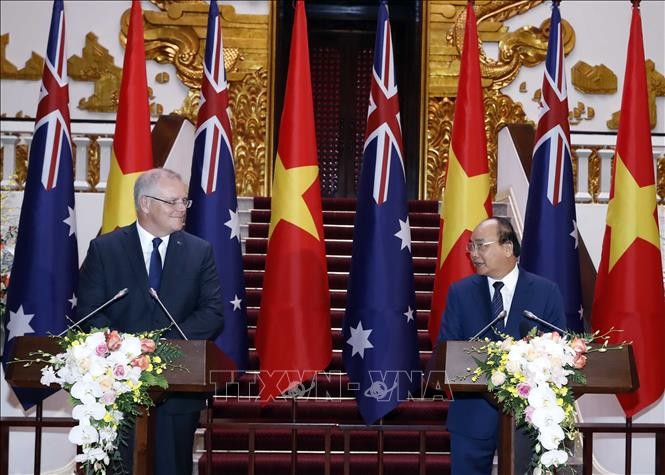(VOVWORLD) - Australian Prime Minister Scott Morrison on Saturday concluded his three-day official visit to Vietnam, where he met Prime Minister Nguyen Xuan Phuc, National Assembly Chairwoman Nguyen Thi Kim Ngan and Vice President Dang Thi Ngoc Thinh. He attended a meeting with the business communities of both countries and paid tribute to President Ho Chi Minh at his Mausoleum.
|

Australian Prime Minister Scott Morrison (L) and Vietnamese Prime Nguyen Xuan Phuc attend a press conference to announce the results of their meeting on August 23, 2019. (Photo: VNA)
|
Mr. Morrison also visited the Vietnam People’s Army’s Level-2 Field Hospital No. 2 at the Hanoi-based Military Medical University, and the construction site of the Vietnamese Formula 1 circuit project in Hanoi.
Vietnam and Australia issued a joint statement, in which they reaffirmed their commitment to boosting bilateral ties to a new height. They agreed that Vietnam and Australia’s Plan of Action for the Strategic Partnership for the period of 2020-2023 will focus on three priority areas: enhancing economic engagement; deepening strategic, defense and security cooperation; and building knowledge and innovation partnerships. The two countries welcomed the 10th anniversary of the Agreement Establishing the ASEAN-Australia-New Zealand Free Trade Area and the work underway to upgrade that Agreement while pledging to work together to facilitate the Comprehensive and Progressive Agreement for Trans-Pacific Partnership.
Both sides will strengthen collaboration in knowledge and innovation, including between public services and establishing a Vietnam-Australia Centre at the Ho Chi Minh National Academy of Politics.
They are committed to protecting the health of the oceans by reducing plastic waste, sharing technologies and expertise, and improving the sustainability of fishing.
Vietnam and Australia remain committed to an open, inclusive, prosperous and secure region with respect to international law, sovereignty, independence, and territorial integrity. They reaffirmed the importance of ASEAN centrality and ASEAN-led architecture, particularly the East Asia Summit.
They emphasized the importance of freedom of navigation and overflight, compliance with international law, and maintenance of a rules-based order. They called on all parties to exercise self-restraint and avoid actions that may further complicate the situation. They also reaffirmed the need for states to resolve disputes peacefully, without the threat or use of force, in accordance with international law, particularly the 1982 United Nations Convention on the Law of the Sea (UNCLOS).